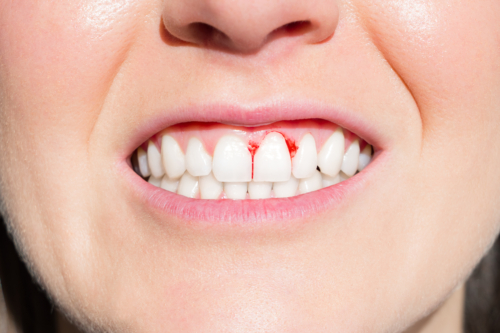
Alone, bleeding gums are not dangerous. Nevertheless, the underlying condition causing this symptom might be.
Regardless of why you’re experiencing bleeding gums, Metropolitan Dental Care can help you find out what’s causing it and help you address this warning sign through periodontal care. So, schedule a dental appointment at our Denver office soon and continue reading to discover seven potential reasons you’re facing bleeding gums.
1. Brushing Too Hard
A common misconception is that brushing teeth harder cleans teeth better. However, this is far from the truth. In fact, vigorously brushing your teeth puts your gums at risk for bleeding and gum recession. Instead, use a soft-bristled toothbrush and fine-tune your brushing technique.
2. Irregular Flossing
Do your gums hurt or bleed after flossing? If so, it’s likely because your gums are not used to habitual flossing. Similar to how muscles become sore after starting a new exercise routine, your gums can become sore after exposure to a new flossing regimen.
Although initial discomfort or bleeding might be discouraging, don’t stop flossing! As you become accustomed to flossing, your gingival tissue becomes stronger and healthier. Thus, leading to less discomfort and bleeding.
3. Deficient Diet
Vitamin C and vitamin K are essential for gum health. First of all, vitamin C helps grow and repair tissues. So, if your body doesn’t absorb enough vitamin C through your diet, you might get swollen and bleeding gums.
Vitamin K helps blood properly clot. Consequently, if you don’t have an adequate amount of vitamin K, it can result in bleeding issues, like bleeding gums.
4. General Health Problems
Specific general health problems (including anemia, liver disease, and leukemia) might cause bleeding gums.
5. A Side Effect of Medication
Some medications increase the risk of developing bleeding gums, including NSAIDs (non-steroidal anti-inflammatory drugs), birth control, and blood pressure medications.
6. Gingivitis
Gingivitis is the mildest and earliest stage of gum disease. An accumulation of gingivitis-causing bacteria can lead to bleeding gums—as well as swollen, dusky red, and tender gums. According to the Mayo Clinic, the most common cause of this condition is poor oral hygiene. But certain factors (such as age, genetics, and crooked teeth) can increase the risk of developing gingivitis.
Pregnancy Gingivitis
Are you expecting? If so, congratulations! Secondly, don’t forget to schedule a dental check-up and cleaning if you haven’t seen your dentist in the past six months or are experiencing noticeable differences in your smile.
As your body changes, so do your gums. One of the top reasons to take time to visit your dentist during pregnancy is that up to 75% of pregnant women suffer from gingivitis due to hormonal fluctuations. Taking care of your oral health during pregnancy is good for you and healthy for the baby. Furthermore, periodontitis (the advanced form of gum disease) is associated with preterm labor and low birth weight.
7. Improperly Fitting Dentures
Dentures that fit comfortably improve the way your mouth feels, functions, and looks. On the other hand, dentures that fit incorrectly can cause many oral health issues. For instance, improperly fitting dentures are abrasive, causing scratches and sores on soft oral tissues.
Notice bleeding gums? Arrange an appointment with your dentist.
If your gums are bleeding, don’t shrug it off. Alternatively, call (303) 534-2626 or message us online to schedule an appointment at Metropolitan Dental Care. At your visit, one of our caring Denver dentists will identify the underlying cause of your bleeding gums and determine the most appropriate treatment.

